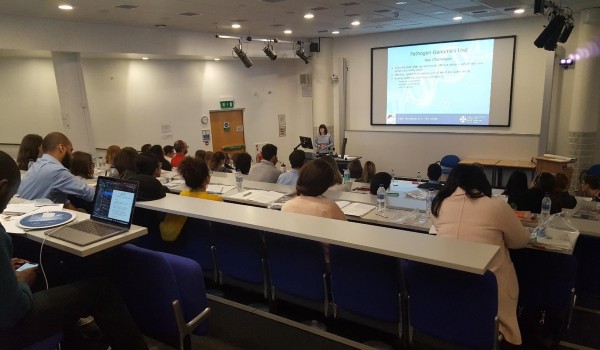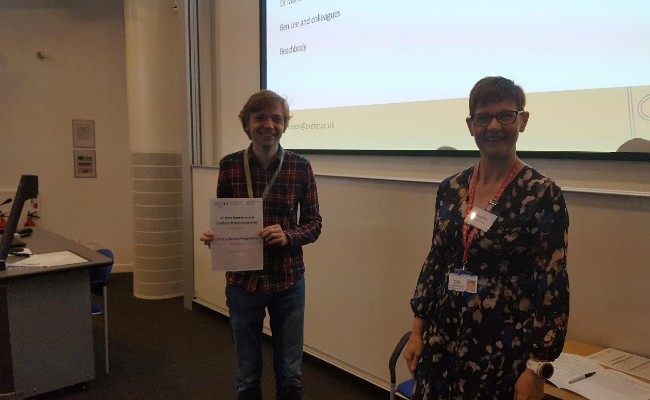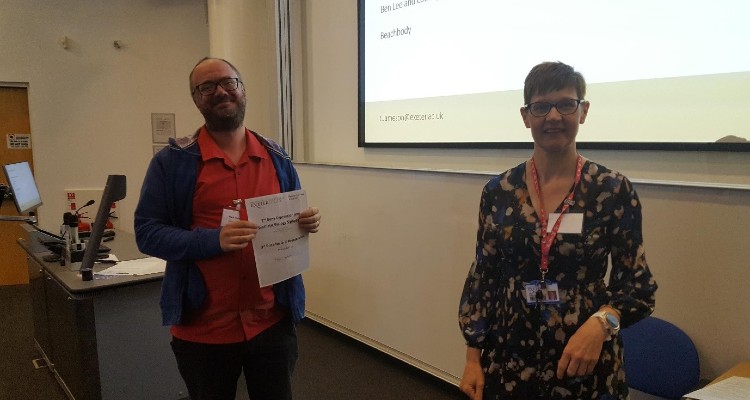2019 Researcher Led Initiatives
In 2019 we had 35 high quality applications made to the Researcher-led initiative awards, with 21 being successfully funded. We would like thank all of those who applied for an award and congratulations to our new award holders. You can find below a selection of funded awards from 2019.
Click here for this year's Researcher Led Initiative awards.
Award holder: Veronica Heney and Zaina Mahmoud
On Tuesday 16th of April, we successfully held a workshop on Sensitive Interview training. The workshop was attended by 29 participants, who had previously registered via Eventbrite. The workshop had been advertised via email, twitter, and on the Doctoral College website; we had hoped to run the workshop for around 30 people, in order to reach a significant number of people while maintaining an intimate and appropriate atmosphere for the discussion of sensitive and complex topics. Participants included PhD students, researchers and postdoctoral fellows, and senior academics from a range of disciplines; this brought a variety perspectives and experiences into conversation.
The workshop was held in the Forum Exploration Lab 2; this room was specifically selected to maximise accessibility, as it can be reached via lifts in addition to stairs. The room was re-arranged to encourage participation, informality, and group discussion by bringing tables into the centre of the room.
Upon arrival, participants were provided with name badges, on which there were spaces for participants to write in their pronouns, to help ensure that everyone could be comfortable and could be addressed correctly. Participants were also provided with pens and paper.
The workshop began promptly, with a brief outline of health and safety requirements, the location of the toilets, and the possibility for photographs to be taken. Dr Liz McDonnell, the workshop lead, was then introduced. Dr McDonnell is an experienced social researcher who has worked for a number of years in academic and community settings conducting research around crime, health, sexuality, family/parenting, disability, education, employment disadvantage and psychotherapy-related issues. She is employed as a research fellow in the Sociology Department at Sussex University and chairs the Social Science and Arts Research Ethics Committee. Her varied and extensive research expertise made Dr McDonnell the ideal person to both disseminate complex and in-depth information, and also to create and hold a safe and thoughtful space in which students and researchers could discuss their concerns about sensitive interviewing.
Dr McDonnell began with a short introductory exercise through which participants might get to know those sitting at their table by discussing their early childhood understandings of gender; this opened space for the consideration of complex and perhaps personal topics. Participants then engaged in a story completion exercise, which gave participants a chance to explore and articulate their concerns around the sensitivities in their research within a hypothetical scenario. Dr McDonnell then began her presentation by exploring what sort of research might be defined or described as “sensitive”, including ideas around vulnerable populations and particular types of data, and the complexities or uncertainties of such a label. Dr McDonnell then went on to particularly discuss trauma, including a discussion of how research might either contribute to re-traumatisation or alternatively might take a trauma-informed approach in order to avoid this.
Dr McDonnell then went on to specifically discuss the function of interviews in the context of sensitive topics, and the ways in which a relational approach to interviewing might be beneficial. She then covered a number of practical tips and strategies for conducting interviews effectively and appropriately, and for building rapport and creating a caring interview space. This section also included an overview of different interview types and modes.
The group then broke for a coffee break, during which participants continued making valuable connections and exploring a number of issues which had arisen through the training.
In the second half of the session, participants engaged in a further activity, in which they worked in pairs to explore the various sensitivities of each other’s research. This allowed them to see their projects from a different perspective, potentially highlighting unforeseen complexities. This was followed by a summary of both procedural ethics and situational ethics, the potential benefits of engaging with institutional ethics procedures, and the ethical requirements which continue after an interview, including data care.
Dr McDonnell then described practices of reflexivity, through which researchers might situate themselves within the research. This lead to a third practical activity, in which participants were given time to reflect on and attempt to answer three questions regarding ways in which their own values, agenda, and positionality might impact their research practices. Finally Dr McDonnell outlined existing literature on researcher self-care in sensitive research. The participants then worked together in small groups to write down on large sheets of paper self-care action plans for researchers. These were all photographed and shared with all participants via email following the workshop.
Participants were then invited to the Wellcome Centre for Cultures and Environments of Health for lunch, during which participants continued to connect and to discuss the issues raised during the morning session. Feedback from the morning was extremely positive, and several participants explicitly expressed enthusiasm for the possibility of future events or establishing a network of researchers involved in sensitive research topics. Permission was given to use the email addresses of participants in order to disseminate information about these potential future activities; these will be followed up on by the organisers.
Throughout the morning the tone of the workshop was conversational and informal; participants regularly asked questions, and Dr McDonnell very generously shared a range of her own experiences in different interviewing contexts. Participants also shared their own experiences; this reciprocal sharing allowed for a sense of mutuality and made the most of the wide range of expertise in the room. The frequent practical activities ensured that the presentation was appropriately broken up, and that participants had a chance to make tangible use of what they had learned.
It was decided that as a result of the potentially personal nature of the discussion during the training that it would not be appropriate to livestream or video record the training. However the slides from the training were made available to those unable to attend in person, and one of the workshop organisers made a visit to Penzance in order to go through the slides in detail with two individuals to ensure that they were able to experience the training as fully as possible.
Pictures from the event:
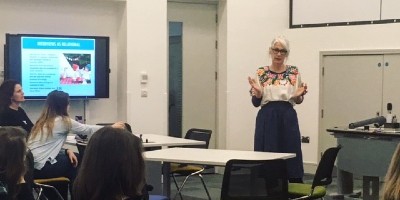
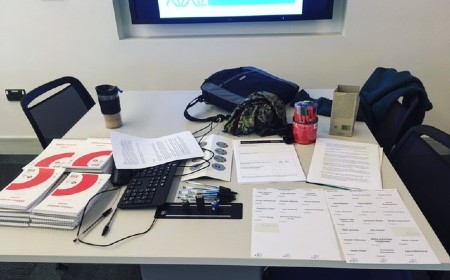
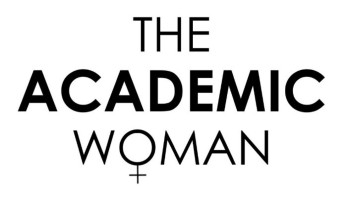
Award holder: Virginia Thomas
The Academic Woman is a network for all women in academic institutions, in academic or professional roles. The Academic Woman seeks to increase gender equality in academia through awareness raising, capacity building and networking.]
The physical network is based at the University of Exeter and is open to all staff and students who identify as female. This is complemented by a virtual network, sustained via The Academic Woman website and social media accounts (specifically LinkedIn, Facebook and Twitter), aimed at our comrades in other academic institutions.
Funding was used to provide catering at the ‘Inspiring Women’ seminars which are the keystones of the network at the University of Exeter. The Academic Woman held monthly seminars from January to April inclusive with speakers from across the university (see list below). (NB this exceeded the RLI funding application target of hosting three seminars).
- 23rd January Professor Francesca Stavrakopoulou
- 20th February Astrid Wissenburg
- 22nd March Professor Alison Harcourt
- 24th April Professor Juliet Osborne
These seminars were complemented by two ‘world café’ style events (which funding was also used to provide catering for). The first of these was held on International Woman’s Day (8th March) in association with the University of Exeter’s Doctoral College as a ‘call to action’ on the International Woman’s Day theme of ‘balance for better’. The second was held on 13th May on the topic of gender equality in higher education and again was a ‘call to action’. This event was open to all staff at the University of Exeter and brought together themes identified during the Inspiring Woman seminars. This event aligned with The Academic Woman’s aims of raising awareness of gender inequality and how to address it within the wider university community, specifically in disseminating the message to the wider community (including those who identify as men). This event was proposed in the Academic Woman’s funding application in order to reach a wider, more diverse audience (especially those identifying as male) so as to spread understand of and positive action in relation to gender inequality.
A marketing banner and branded USBs, with lanyards, loaded with resources were also purchased using funding. The banner was displayed at events and the USBs were given out at the gender equality in higher education world café. These promotional and educational materials help to raise awareness of the network and, in terms of the information loaded on the USBs, provide resources for network members.
The information provided on the USBs is supplemented by information on the website which also extends the influence of network to a wider audience. The Academic Woman website is hosted by Wix and some of the RLI funding was allocated to payment of hosting fees to allow the network to continue to exist online, thereby reaching a wider and larger audience than it can within the University of Exeter.
Award holder: Gemma Delafield
ExeterEnergy, an initiative bringing together over 130 individuals across the university that work on energy systems, launched its very first seminar series in February 2019. The ‘Making Sense of Sustainable Energy Systems’ seminar series was held to showcase the inspiring research being conducted on energy by PGRs and ECRs across the university. Open to everyone, the seminar series helped to bring together researchers across both campuses and all departments to share ideas.
With the RLI funding, 5 x 1 hour seminars were held across both the Penryn and Streatham campuses to showcase the research of 9 PhD and early-career researchers working on energy. Following feedback from attendees, the final seminar was expanded to include a networking lunch to provide more opportunity to meet other ExeterEnergy researchers.
The seminar series promoted interdisciplinary research by providing the opportunity for researchers from multiple disciplines the chance to get together and share their ideas. The seminars were held across both campuses and streamed live to the respective campus to improve accessibility to talks. In additional to this a link to stream the event was sent to external stakeholders who expressed an interest in the talks, but were not located on either campus. A travel budget was offered to allow people them to move between the campuses however unfortunately no attendees applied for the travel budget. Feedback showed that a 1 hour seminar plus the opportunity to network was not seen as reason enough to travel between Exeter and Cornwall. Over half of the presenters travelled to a campus where they are not based to present allowing them to widen their networks. The speakers in particular remarked upon how useful it was to discuss their research with a varied audience with the Q&A session often being cited as the most beneficial part of the seminar. The speakers were selected from a wide range of disciplines and across campuses with care being taken to ensure gender diversity:
- George Crossley, Postdoc, Renewable Energy, CEMPS
- Richard Lowes, PhD, Energy policy group
- Eleanya Nduka, PhD, Economics, Business School
- Siddhartha Dabhi, PhD, Business School
- Kikelomo o Kila, PhD, Law, SSIS
- Korinus Waimbo, PhD, Centre for Water Systems, CEMPS
- Catherine Queen, PhD, Geography, CLES
- Emily Stebbings, PhD, Renewable Energy, ESI
- Yang Qu, PhD, Renewable Energy, ESI
In total, there were approximately 75 attendees to the seminars across Streatham and Penryn including an individual from an external organisation who accessed the seminars remotely. Slides were also uploaded to the ExeterEnergy website to allow those unable to attend the seminars access to the content.
Overall the feedback from the seminars was very positive. One of the most frequently remarked upon advantages of the seminar was its transdisciplinary nature which gave people the opportunity to network with people they would not usually get the chance to meet. The attendees really enjoyed the fact that the seminar series aimed to break down the traditional barriers between disciplines and departments. Speakers were encouraged to pitch their talks to a wide audience and relate their research to the wider challenge of transitioning to a low carbon economy. This led to the audience being able to follow the talks and engage with them even if they were completely outside of their own research area.
Following the final seminar, the seminar organisers have met to discuss what could be done to improve the seminar series for the future.
Pictures from the Seminar Series:
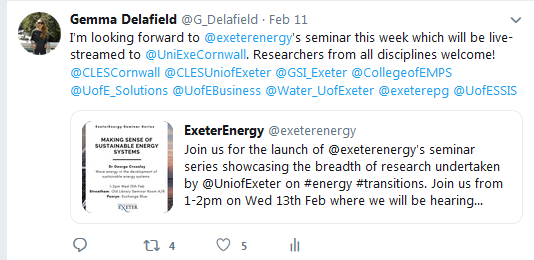
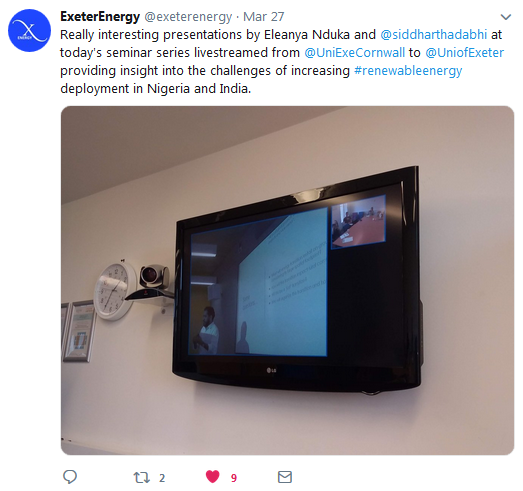
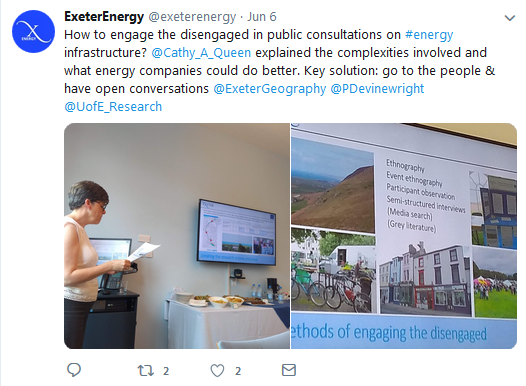
Award holder: Ben Lee
The Gene Expression and Synthetic Biology Symposium ran on the 2 May 2019. Over eighty people registered for the event although it was attended by 64 people on the day. Of those, the majority were from colleges across Exeter University but there were 7 attendees from other Universities across the South West, including UWE, Bristol and Cardiff. The visiting plenary speaker was from NHS Wales. All of the attendees were invited to complete feedback forms but only 25 forms were returned. Scores from the feedback forms indicated that out of a possible score of 125 the workshop was rated at 116. There were no individual scores less than 4 and all said they would recommend it to a fellow researcher.
The event was well supported by 6 industry sponsors from: Thermo Fisher, Anachem, Cambridge Bioscience, Eurofins, Fluidigm and Integrated DNA Technologies (IDT). Thermo Fisher and Fluidigm both paid gold level sponsorship which allowed them to give a 10 minute talk on the day. These talks were well received by the attendees with some of the comments on the feedback forms stating this directly:
- “Nice to have short talks from sponsors”
- “Good to have sponsors talk through the technology available”
The sponsors have also provided feedback that they were happy with how the event was organised and will be interested in supporting the event next year.
Comments from the feedback forms showed that attendees thought the day was well organised, enjoyed the mix of talks and enjoyed having an opportunity to see the different ways in which gene expression and synthetic biology techniques are being employed. Postgraduate students and early career researchers stated that they liked having the opportunity to present and the overall mix of talks from senior and more junior ECRs was welcomed, including having a plenary speaker from outside the University. Suggested improvements to the session included expanding it to run talks concurrently, more external speakers and a longer talk times. A number of attendees suggested the addition of a poster session across the lunch time period, as well as the introduction of a technique workshop to learn about how the different technologies work.
Prizes were given out for the 3 best talks and these were awarded to:
- 1st Prize: Tom Jameson from Exeter University Sports Science
- 2nd Prize: Sam Washer from Exeter University College of Medicine and Health
- 3rd Prize: Mark Hewlett from Exeter University Department of Biosciences
We are grateful to the Doctoral College for the Researcher Led Initiatives grant as it enabled us to build on the success of the first gene expression workshop held in 2018. We aim to run this initiative again next year and establish it as a yearly event across Universities in the South West.
Pictures from the event:
